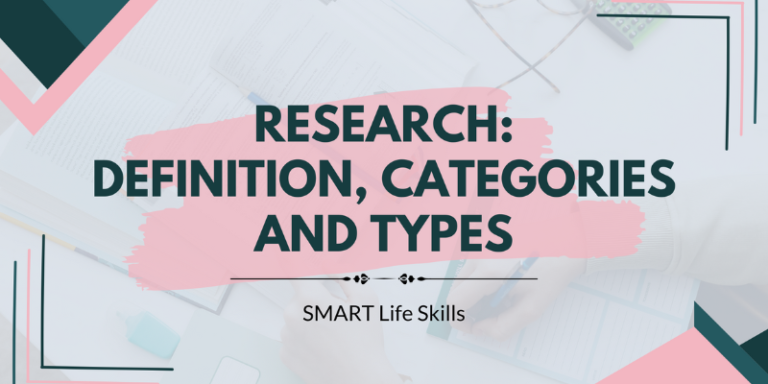1.0 Definition of Academic Research
Research is a systematic investigation aimed at generating knowledge, solving problems, and contributing to the understanding of a specific subject area (Creswell., 2014). It involves the collection, analysis, and interpretation of data to answer questions, test hypotheses, or validate theories. Research is fundamental to academic and scientific progress. According to Saunders et al. (2019), effective research is not only methodical but also replicable and rigorous, ensuring its credibility. Academic research is crucial in a variety of fields, ranging from the natural and social sciences to the humanities, business etc contributing to advancements in areas such as medicine, technology, education and management (Creswell & Creswell, 2018). As technology continues to evolve, research methodologies also advance, with the internet and digital tools providing new opportunities for data collection and dissemination (Bryman, 2016).
2.0 Categories of Academic Research
2.1 Pure and Applied Research
Pure research, also known as basic or fundamental research, is driven by curiosity and the desire to expand knowledge without immediate practical application. Its primary aim is to enhance the understanding of underlying principles and theoretical concepts. According to Collis and Hussey (2014), pure research is essential for the development of new theories and models, and it often provides the foundation for applied research. Examples of pure research include theoretical physics, biology, and studies in abstract mathematics, where the goal is to advance knowledge in the field, often without a clear focus on its practical application.
On the other hand, applied research is concerned with finding practical solutions to real-world problems. Applied research often builds on the theoretical frameworks developed through pure research, translating them into practical applications. It is commonly conducted in fields such as engineering, medicine, and business, where there is a need to solve specific problems or improve processes. For example, research on improving workplace productivity, developing new medical treatments, or enhancing environmental sustainability would be considered applied research. According to Saunders et al. (2019), applied research is often more outcome-focused, with an emphasis on generating results that can be implemented in the short term.
2.2 Primary and Secondary Research
Primary research involves the collection of original data through direct investigation, often referred to as empirical research. It seeks to gather new information from sources such as surveys, interviews, experiments, or observations. As Bryman (2016) highlights, empirical research is essential for answering specific research questions that have not been addressed in the existing literature. It allows researchers to collect data firsthand, ensuring that the information is directly relevant to the research objectives.
In contrast, secondary research relies on existing data and information that has already been published. Also referred to as theoretical or conceptual research, secondary research involves analysing and synthesising information from academic papers, books, reports, or other sources. According to Creswell (2014), secondary research is useful for reviewing what is already known about a topic, identifying gaps in knowledge, and building theoretical frameworks. While it may not produce new data, it provides a critical foundation for further empirical research by helping to contextualise findings and relate them to existing theories.
Note: Primary research is also known as empirical research and secondary research is also known as theoretical or conceptual research.
3.0 Types of Academic Research
3.1 In-Organisation/ Company-Focused Projects
Organisation-focused research projects involve investigations conducted within a specific organisation or company. The research is often designed to address issues or challenges faced by the organisation, such as improving operational efficiency, understanding customer behaviour, or exploring new market opportunities. This type of research is particularly common in business, management, and industrial contexts, where the findings are directly applicable to the organisation’s goals.
Saunders et al. (2019) note that these projects are typically applied research and can be both quantitative and qualitative, depending on the nature of the problem being investigated. For example, an organisation-focused project might involve conducting employee surveys to understand job satisfaction levels or analysing financial data to improve cost-efficiency.
3.2 Generic, Industry/ Sector-Based Projects
Industry-based research projects are broader in scope than organisation-focused research, as they aim to address issues relevant to an entire industry or sector. This type of research often focuses on trends, innovations, and challenges within a particular industry, such as healthcare, technology, or manufacturing. Industry-based projects might involve analysing market trends, studying consumer behaviour, or evaluating the impact of new technologies on the sector.
These projects are highly valuable for stakeholders within the industry, as they provide insights that can inform strategic decisions, policy development, and competitive positioning. Bryman and Bell (2015) suggest that industry-based research projects often involve collaboration between academic researchers and industry professionals, ensuring that the research is both academically rigorous and practically relevant.
4.0 Library Projects
Library research projects primarily involve secondary research and focus on gathering, synthesising, and analysing existing information rather than generating new data. These projects typically involve extensive literature reviews and the use of secondary data sources such as academic journals, books, reports, and online databases. Library research is common in fields such as history, philosophy, and theoretical studies, where the primary objective is to build a comprehensive understanding of a particular topic based on existing knowledge.
Library research projects are critical for developing theoretical frameworks, supporting hypotheses, and identifying gaps in the literature. According to Creswell (2014), these projects play an essential role in shaping the direction of future empirical research by laying the groundwork for hypothesis testing and theory development.
Research plays a pivotal role in advancing knowledge across different fields, and it can be categorised based on its purpose and methodology. Pure and applied research represent two ends of the spectrum, from theory development to practical problem-solving. Primary and secondary research further distinguish between the collection of new data and the synthesis of existing information. Finally, organisation-focused, industry-based, and library projects provide specific contexts within which academic research is conducted. Each type of research contributes uniquely to the broader academic and practical landscape, and understanding their distinctions is essential for conducting effective research.
References:
Bryman, A., & Bell, E. (2015) Business Research Methods. Oxford University Press.
Creswell, J. W. (2014) Research Design: Qualitative, Quantitative, and Mixed Methods Approaches. Sage Publications.
Saunders, M., Lewis, P., & Thornhill, A. (2019) Research Methods for Business Students. Pearson.
Collis, J., & Hussey, R. (2014) Business Research: A Practical Guide for Undergraduate and Postgraduate Students. Palgrave Macmillan.













